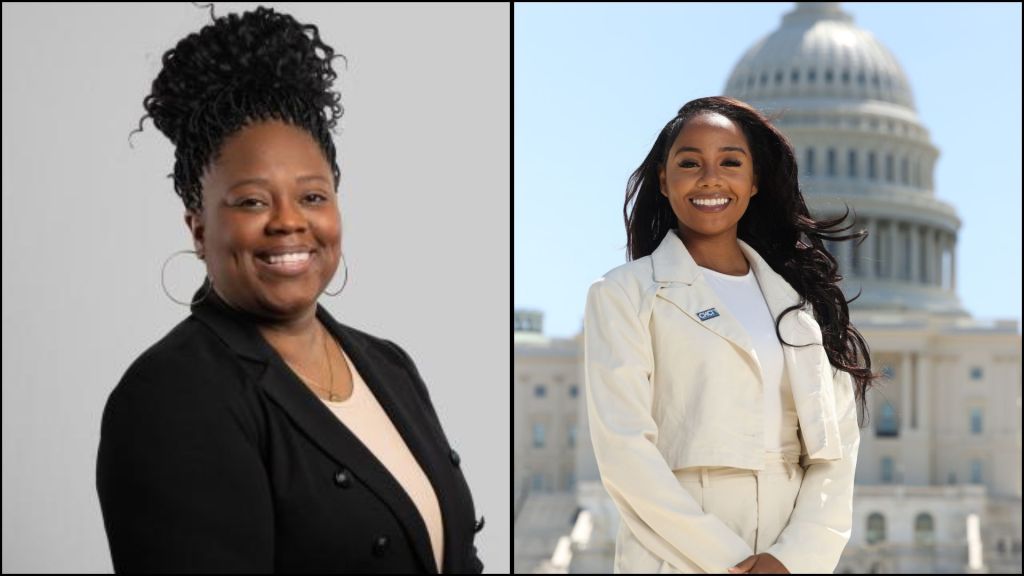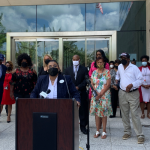By Megan Sayles
AFRO Business Writer
msayles@afro.com
Black immigrants are concerned about what the next four years could mean for their communities, as anti-immigration rhetoric continues to grow.

Central to President-elect Donald Trump’s platform has always been a severe crackdown on immigration. Now, after his 2024 win, the former president has been even more outspoken about his plans for restricting legal immigration, completing his border wall, cutting federal funding to sanctuary cities and leading the largest deportation in American history.
Though Black immigrants are often overlooked in national conversations, the Pew Research Center reports that one in five Black people in the U.S. are immigrants or the children of Black immigrants. People of African origin, specifically, have experienced the fastest-growth in the U.S. Black immigrant population, accounting for 42 percent.
Information from the Pew Research Center also states that in 2023, the U.S. foreign-born population hit a record 47.8 million. This is up 1.6 million from 2022, accounting for the largest annual increase since 2000.
As the guard changes, Black immigrants are battling uncertainty regarding their future in the country under the former president that has already shown who he is when it comes to immigration policy.
“Our community is extremely concerned, and not for nothing–we’ve already experienced a Trump 1.0,” said Diana Konate, deputy executive director for policy at African Communities Together. “Based on what he has described, we expect an even harsher Trump 2.0 as it relates to immigration.”
Konate was born in Côte d’Ivoire, a country in West Africa, and moved to the U.S. when she was eight years old. Her organization fights for civil rights and opportunity for African immigrants in the U.S.
Prior to the 2024 election, the nonprofit worked to secure temporary protected status (TPS) for various African communities, including Sudan, Ethiopia and Cameroon. While circumstances vary between countries, Konate explained that people of African origin may face political instability, war or even distressed economic conditions.
Her concern extends not just to undocumented immigrants but to asylum-seekers and immigrants with legal status as well.
“In the rhetoric that we’re hearing from Trump, everyone gets lumped into this ‘illegal immigrant’ narrative. There’s a lot of confusion about who is undocumented,” said Konate. “If someone has an asylum application, and they haven’t heard back yet, are they at risk for deportation? In addition, we have a lot of members who currently have TPS, and Trump has said that he will be doing away with that.”
Sylvie Bello, founder of the Cameroon American Council, said she was not surprised by the outcome of the 2024 election. The D.C. resident believes Democrats did not effectively engage the African immigrant community in the U.S., especially as their population continues to rise in the country.
“At the Cameroon American Council, we work in 30 states and we talk with Africans,” said Bello. “I could tell that they were just not lockstep with the Democratic Party.”
She said party leaders failed to address language access when communicating with African communities and didn’t consider religious diversity in a meaningful way, noting that much attention was given to Black Christian churches. Bello said that African immigrants also may lean more to the conservative side when it comes to social policies. As abortion rights were a top issue for Vice President Kamala Harris’ campaign, some may have been moved to cast their ballot for the former president because it is more in line with mores and values taught in their native land and passed down today.
Though the president has used hostile rhetoric about African nations, including calling them “s***hole countries,” Bello said some African immigrants would side with this perspective.
“People who left those countries would say, ‘He’s right, that’s why I left. The presidency was bad. The economy was bad. The currency was bad,’” said Bello. “Unfortunately, it’s like Stockholm Syndrome– some folks will be oblivious.”
“They’re thinking I had to cross eight countries to come to America on foot and get to the Southern border. I did that for a reason. There was a push factor that led me to flee my country,” she continued.”
Unlike Bello, Morelys Urbano, an undocumented student at Morgan State University, was shocked by the former president’s win. She was heavily involved in Harris’ campaign and even flew from Maryland to Arizona to canvas for undecided voters.
“It was very disappointing to see– especially as someone who cannot vote,” said Urbano. “I felt very helpless as if I had to do 10 times more to get more people out to vote so I could feel like my ‘vote’ counted.”
The 22-year-old hails from the Dominican Republic, though she spent several years in Spain before moving to the U.S. in 2017. When President Joe Biden was elected in 2020, she did not have fears over her immigration status. The 2024 outcome has left her feeling anxious.
“I had plans of going to graduate school for a Ph.D. after my undergraduate degree, but I had to give up on that dream right after Nov. 6,” said Urbano. “A whole doctorate involves a lot, and I cannot just start a program when I fear my own deportation or the deportation of family members.”
Urbano considers immigration a human rights issue. She believes that the pathway to U.S. citizenship, which is associated with complex paperwork, lengthy processing times and language barriers, must be improved.
“You come to this place where you have nothing. You start from zero, and you have to still be resilient enough to make it happen. It’s a journey that not everybody wants to endure, and it’s not an easy journey,” said Urbano. “People need to understand that there needs to be more humane policies in place and a quicker process.”
Rebkha Atnafou, an African immigrant and CEO of RnD Associates, said there is no easy solution to address the mass immigration that the U.S. faces. However, she does not think the president-elect’s intentions for mass deportation or an expanded border wall will be effective.
“Many people are battling ideas of photos of men on horseback with whips chasing would-be immigrants on the Southern border from a few years back to those being housed in posh hotels with three meals and expense cards,” said Atnafou. “Although both images occurred during different administrations, they each created a public uproar and resentment toward immigrants. What is a fair process to accommodate or turn away mass immigrants?”
AFRO International Writer Daquan Lawrence contributed to this article.
The post Lives in limbo: Immigrants grapple with uncertain future post 2024 election appeared first on AFRO American Newspapers.










